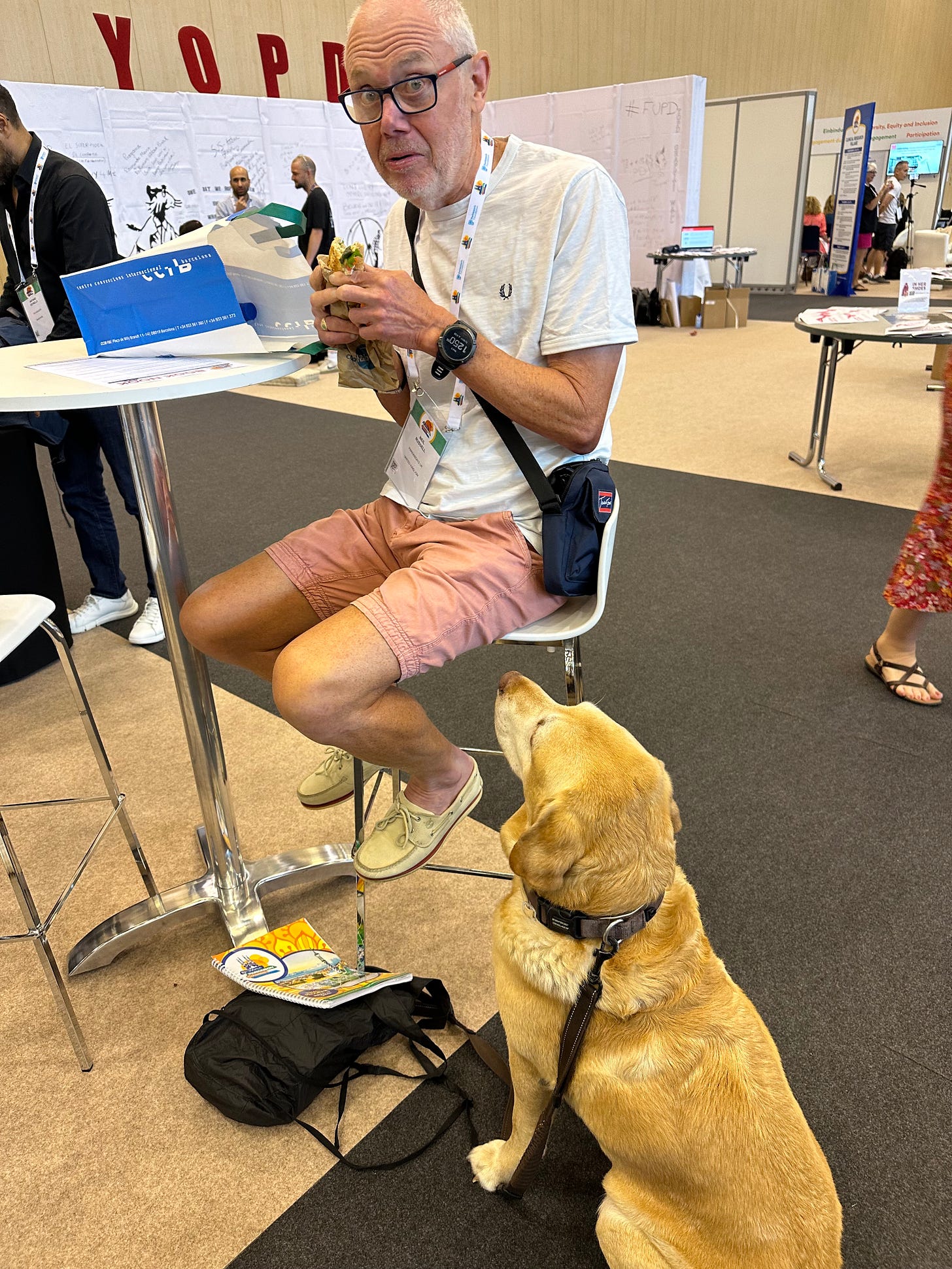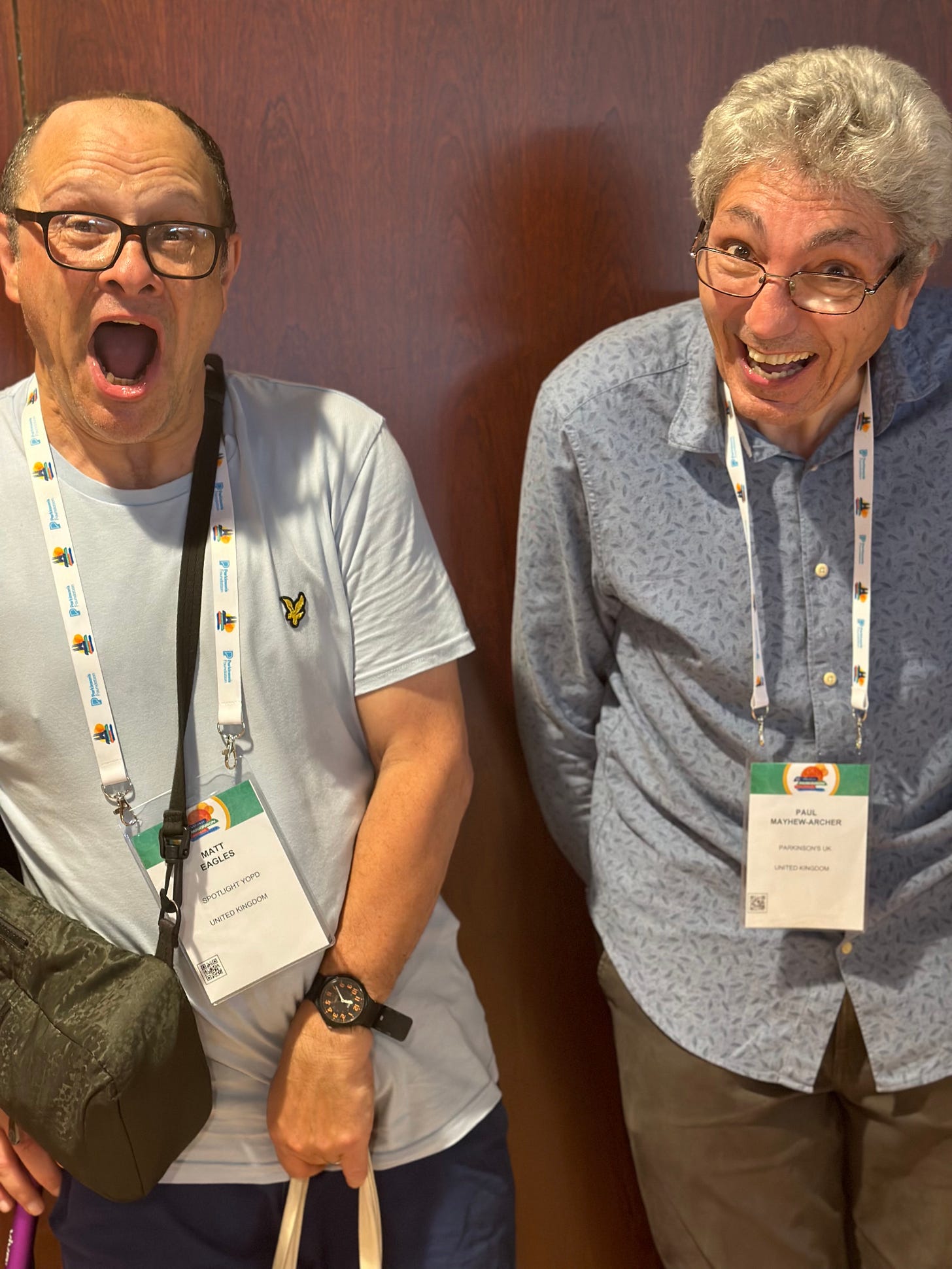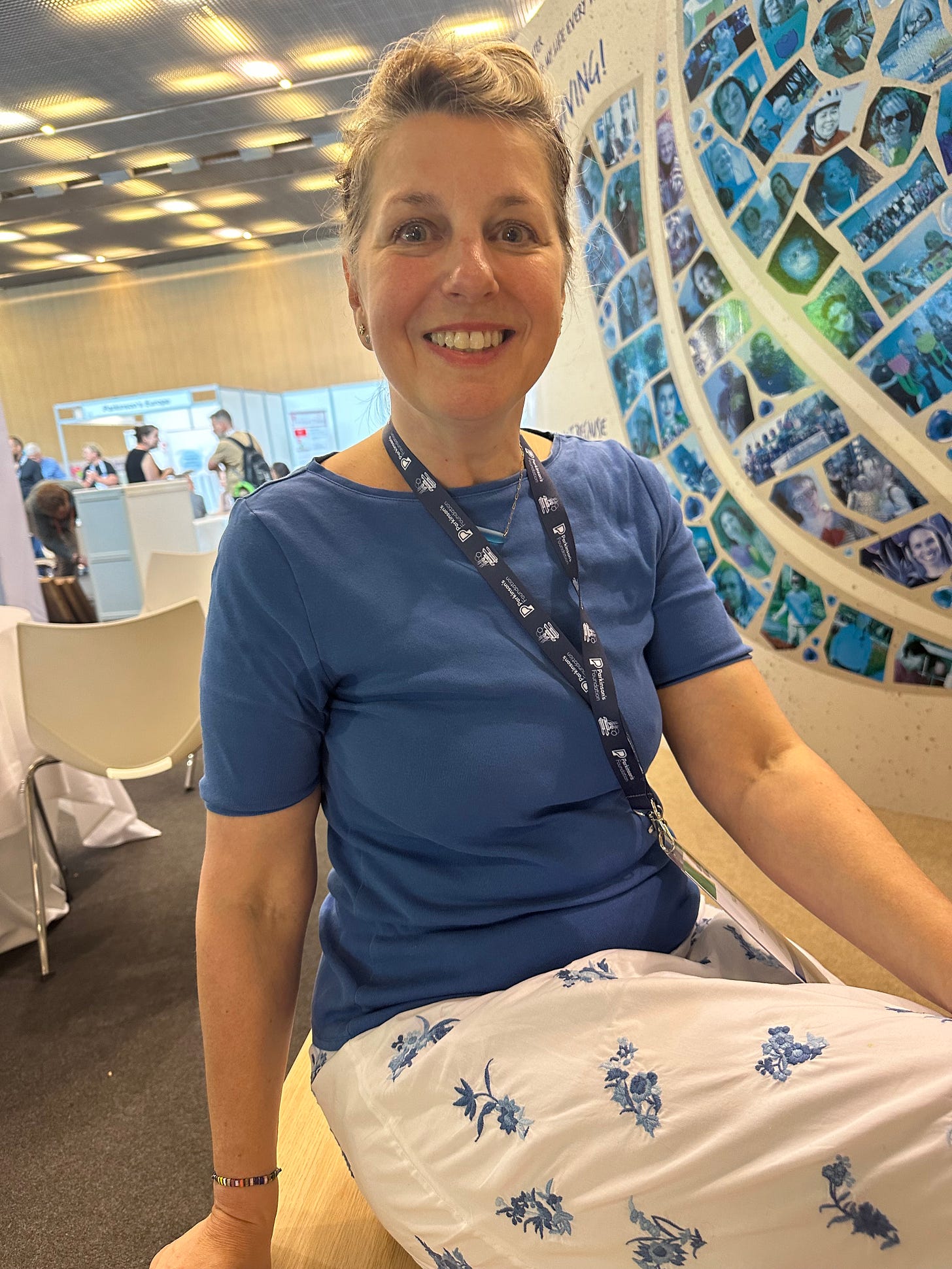A glance at the programme for World Parkinson’s Congress leaves me feeling slightly daunted. It’s like arriving at a world class university and being told you can take any course you want. I could go to “mitochondrial dynamics in neuroinflammation’, or “assessing the biomarker potential of LRRK2 and GCase in Parkinson’s disease monocytes’. I could learn about “novel insights in the therapeutic benefits of exercise-related interventions” or “how can AI help?”
Or maybe I should make it to the session on “Apathy and Fatigue: Underrecognised non-motor symptoms”? Nah, can’t be bothered, too tired (ok, weak joke). In truth, there is a wealth of rich and fascinating content to be found at WPC 2023 in Barcelona but for me day 2 was all about meeting all sorts of brilliant “Parkies” - here are just a few of them.
Neil Russell
Roaming the exhibition hall taking pictures I came across a quiet man eating a sandwich while his golden retriever looked on hopefully. Rather wishing my dog at home was so sociable I asked if I could take their photo and the man nodded. Half an hour later when his partner Nicky turned up I discovered that the quiet man was the amazing Neil Russell who, as I described recently, ran all the way here from the UK.
Neil, a former advertising executive who realised he had Parkinson’s when the handwriting he prided himself on deteriorated, has been running ever since his diagnosis, despite quite severe PD symptoms. A living, breathing example then of “the therapeutic benefits of exercise-related interventions”. And Nicky - “don’t call me his carer, I’m his Executive Assistant” - is also an inspiration, keeping the show on the road as they crossed the continent, starting running at 2am to avoid the heat. So far, they have raised over £10,000 for Parkinson’s charities. Find out more here
Matt Eagles
Now Matt Eagles is anything but a quiet man, a noisy exuberant fellow who is a bit of a superstar amongst we Parkies. But it was not until I sat him down for an interview with Paul Mayhew-Archer for a special episode of Movers and Shakers (the Parky God willing) that I realised just how extraordinary his story was.
Matt is now 54 but he has had Parkinson’s since he was 7 - though doctors struggled to diagnose it at first - and has been on Sinemet, the best-known PD drug, since the late 1970s. When Paul asks him whether he was teased by the other kids, he says the teachers were far worse. “My Latin teacher used to call me ‘dead legs’” while another teacher made him lie on the floor because he was impatient with Matt’s struggles to get into a chair.
But meanwhile, through his childhood he was by chance doing all the right things:
“I had speech and drama lessons. I was playing table tennis. I was staying active. All the things that now are coming to the fore that they're really good for people with Parkinson's.”
But the real secret behind the way Matt has navigated living with Parkinson’s for nearly 50 years is his positivity. He has been through some dark times, at one stage fearing he might lose his voice and his ability to communicate, but he decided there was only one way for him to live.
“Years and years and years ago I took a vow of positivity. And I realised two things -one, my symptoms weren't as bad now I'm positive. And two - people actually like you and come and talk to you. And that to me is brilliant - it's all I need.”
As we parted, Matt gave me a t-shirt with the slogan “I’m not pissed, I’ve got Parky’s”. I’ve promised to wear it all day today - this positivity is catching.
Jo Tosh
Women with Parkinson’s are increasingly determined to make their voices heard, battling against the stereotype that it is an old man’s disease. Jo Tosh is one such voice and she sought me out to tell me her moving yet hopeful story. She had a theory why Parky women are so invisible - we men have role models such as Michael J. Fox, Billy Connolly and Jeremy Paxman, whereas famous female Parkies are thin on the ground. She cited a soap actress who was quietly dropped after she “came out” and wondered whether other celebrities feared that the impact on their careers would be negative.
Jo described how 2022 had been her “annus horribilis” - with her Parkinson’s symptoms worsening she and her husband had separated just as she prepared for a DBS (Deep Brain Stimulation) operation. But now things were so much better - she came through the operation well, with the support of her two children and a new partner, and the DBS seems to have worked wonders, alleviating the pain which appears to be a symptom for women far more than for men.
Through the whole DBS experience Jo has been working with a video crew from Parkinson’s UK, and one of the films they have made has won an award. Jo’s is another quiet voice but one that is succeeding in getting a hearing for the campaign to raise awareness of the struggles of women with Parkinson’s. You can find out more about Jo on her Instagram account.






Morning Rory, these are great Bios!
Look out too for the chocolate lab, who is another Parky dog and knows how to gently nudge his owner forward when he freezes. Should his lead be dropped he won’t move on until he has picked it up and put it securely back in his master’s hand - he is amazing!
I had another fascinating discussion with Belgian Parky, Jean-Paul De Cremer who runs Parkies Radio, well worth an interview! https://www.radioparkies.com/
My first WPC after 10years of this DX - This week I have finally accepted my PD - because of the truth not widely discussed that PD is a very different disease for every one - both in how it presents & how we are present with it - Keep the words & insights going - thank you